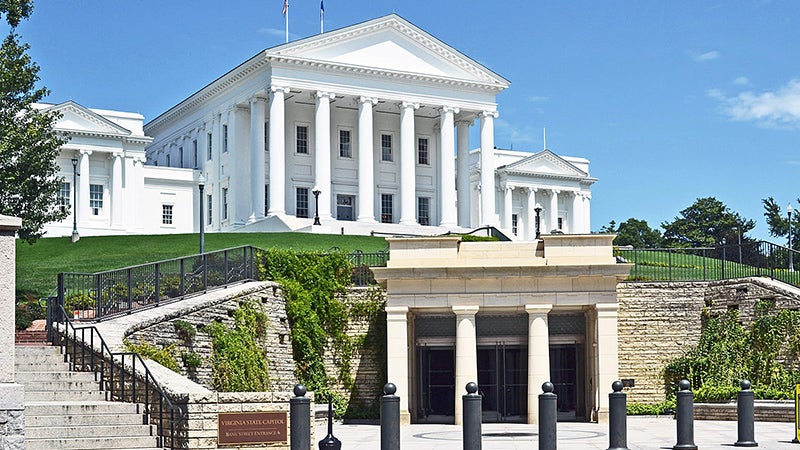Advocates lobby lawmakers to enshrine reproductive rights in state constitution
Published 5:36 pm Friday, February 17, 2023
|
Getting your Trinity Audio player ready...
|
By Faith Redd
Capital News Service
Virginia lawmakers and advocates are fighting to enshrine women’s reproductive rights in the state constitution amid a slew of anti-abortion bills, some which passed the House ahead of the session midpoint.
Virginia Reproductive Equity Alliance, VREA, celebrated “Repro Advocacy Day” last month by lobbying state legislators. VREA is a newly formed coalition of organizations who support reproductive care and access, in addition to advancing racial equity, according to its website.
The groups visited the state Capitol on Jan. 23, the day after the 50th anniversary of Roe v. Wade. Women’s health care has been a mobilizing issue throughout the nation following the U.S. Supreme Court overturning of the 1973 decision that gave women the choice of an abortion. The ruling was overturned in 2022 and gave states authority to allow abortion access.
Diana Tycer recently joined VREA to advocate for abortion rights, she said. Tycer is against any abortion bans and limitations and is “not even happy with what currently exists.” She fears there will be attempts to limit contraception.
“I guess one of the things I fear is that there is an assault on women’s reproductive freedom and that just trying to ban abortion is only the beginning,” Tycer said.
Repro Advocacy Day participants also attended workshops and connected with other advocacy groups. VREA provided transportation from Northern Virginia and Hampton Roads.
Tycer said contacting legislators, whether by writing or in person, is valuable.
“They’re elected to represent us, so they need to be accountable to the people,” Tycer said.
Samantha Plante, development associate at REPRO Rising Virginia, an organization who fights for reproductive health care, attended the event as support staff. Plante said she met “great people” and described the event as “wonderful.”
VREA supported two proposals — Senate Joint Resolution 255 and House Joint Resolution 519 — to amend the state constitution to ensure access to reproductive freedom “as a fundamental right,” and prohibit the prosecution of individuals exercising their right to abortion or aiding another individual.
The Senate measure passed on a 21-18 vote and heads to the House. The House measure died 5-3 on a subcommittee vote to pass it by indefinitely.
“We want to make sure that since we no longer have a federal right to reproductive freedom that we have one in the state constitution,” said Sen. Jennifer McClellan, D-Richmond, during a press conference with other lawmakers about the proposed amendments.
VERA also requested support for Senate Bill 1112, Plante said. The measure, introduced by Sen. Ghazala F. Hashmi, D-Richmond, requires insurance carriers to provide coverage for any prescribed contraceptive drug or device. The bill passed the Senate with some Republican support behind it, and now heads to the House.
“Just really ensuring that all people in Virginia are able to access the medical care that they need and access that easily, so when they’re in a situation they can get the services that they need without too much stress,” Plante said when asked about the potential impact of the bill.
Lawmakers on both political sides have proposed abortion legislation that is likely to fail in either the Democrat-majority Senate or the Republican-led House.
Ahead of the General Assembly session, Gov. Glenn Youngkin encouraged state lawmakers to send him a 15-week abortion ban.
“We can choose life, and choose to support mothers, fathers, and families in difficult decisions,” Youngkin stated in a press release issued last month.
The governor also attended the March for Life annual rally and walk at the State Capitol on Feb. 1. The event is one of the state’s largest anti-abortion marches. Hundreds of people attended and there were 10 speakers, including Youngkin and Attorney General Jason Miyares.
A baby can begin to feel pain at 15 weeks, Youngkin stated. A human fetus cannot feel pain until 24 to 25 weeks, according to the American College of Obstetricians and Gynecologists. The organization was founded in 1951 and creates guidelines for health care professionals.
The Youngkin-backed bills, SB 1385 and HB 2278, proposed a 15-week ban. Both bills failed to advance.
VREA also opposed the legislation listed below:
HB 1795: Abortion; born alive infant, treatment and care, penalty (passed House).
HB 1954: Killing the fetus of another; guilty of manslaughter, penalties (passed House).
HB 2270: Provision of Abortion; right to informed consent, penalties (passed House).
HB 1395: Rights beginning at conception (failed).
HB 1865: Provision of abortion; based on a disability or sex or ethnicity of the unborn child prohibited, penalty (failed).
SB 1284: Abortion; prohibited, exceptions, penalty (failed).
SB 1483: Abortion; viability, treatment of nonviable pregnancy (failed).
HB 1488: Abortion; use of public funds prohibited (failed).
HB 1736: Family life education curriculum guidelines; human reproduction, viewing of ultrasound video (failed).
HB 1894: High-occupancy vehicle (HOV) lanes; pregnant women (failed).
SB 1225: Killing the fetus of another; guilty of manslaughter, penalties (failed).
SR 87: Right to life; recognizing that it begins at conception (failed).
“Over 70% of Virginians believe that a person should be able to make decisions for themselves about their reproductive decisions and keep legislators out of that,” said Sen. Jennifer Boysko, D-Fairfax, co-chief patron on SJ 255, during a press conference last month.
A Wason Center poll released at the end of January reinforced Boysko’s statement. According to the poll, 43% of Virginians would prefer to keep state abortion laws as is, almost 30% would prefer less restrictive laws and 23% want more restrictive laws on abortion.
Capital News Service is a program of Virginia Commonwealth University’s Robertson School of Media and Culture. Students in the program provide state government coverage for a variety of media outlets in Virginia.







